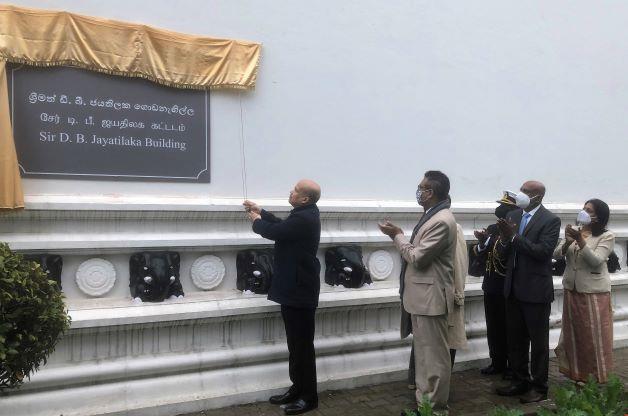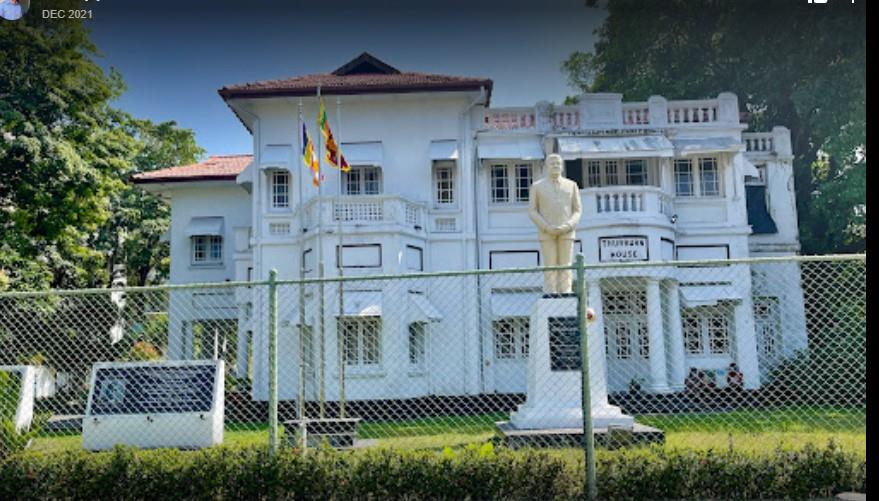(MENAFN- NewsIn.Asia)
New Delhi, February 4 (newsin.asia): To coincide with the event to mark the 74th anniversary of Independence of Sri Lanka, the High Commission of Sri Lanka in New Delhi on Friday named its Chancery Building after Sir D.B. Jayatilaka, Sri Lanka's first representative to India,
This year marks the 80th anniversary of Sri Lanka (then Ceylon) sending Sir D.B. Jayatilaka as its first Representative to India in 1942.
Naming of the Chancery Building after Sir D.B. Jayatilaka comes as the first of a series of activities organized by the High Commission of Sri Lanka in New Delhi this year to mark the important anniversary.
In a simple ceremony attended by the staff of the High Commission, Sri Lanka's High Commissioner to India Milinda Moragoda unveiled the plaque containing the new name of the Chancery Building.
Don Baron Jayatilaka, Statesman, Buddhist Educationalist, Barrister, pioneering literary figure of his era and one time Home Minister of Ceylon, had graduated from the Universities of Calcutta and Oxford. Sir Baron had first come to India to negotiate food shipments to Ceylon by the Government of India, and was later appointed as the first Representative of the Government of Ceylon in New Delhi.
The appointment of Sir D.B. Jayatilaka as Ceylon's Representative to India, which pre-dates the establishment of formal diplomatic relations between independent India and Sri Lanka in 1948, stands testimony to the very special bond and close relationship that the two countries have been enjoying since time immemorial.
Life of D.B.Jayatilaka
Baron Jayatilaka (13 February 1868 – 29 May 1944) was Vice-President of the Legislative Council of Ceylon; the Minister for Home Affairs and Leader of the House of the State Council of Ceylon; and Representative of Government of Ceylon in New Delhi. Sir D. B. Jayatilaka is also considered as a flag bearer of Buddhist education in Sri Lanka.
Born at Waragoda, Kelaniya, he was the eldest male child of Don Daniel Jayatilaka, a government servant, and his wife Liyanage Dona Elisiyana Perera Weerasinha, daughter of oriental scholar, Don Andiris de Silva Batuwantudawe of Werahena. He had two brothers, and two sisters, both of whom died young.
When he was seven years Jayatilaka was sent to the Vidyalankara Pirivena, where he learned Sinhala, Pali and Sanskrit by Ratmalane Sri Dharmaloka Thera. To study English and other subjects in the English medium, he was sent to the local Baptist school from where he was sent to Wesley College in 1881, there he passed the junior and senior Cambridge examinations, travelling daily by cart from Kelaniya to the Pettah.

Sri Lankan High Commissioner Milinda Moragoda unveils the plaque naming the chancery after Sr D.B.Jayatilaka
Jayatilaka graduated from the University of Calcutta with a BA in 1896 and went on to gain a BA in jurisprudence from Jesus College, Oxford in 1913 which was later upgraded to a MA some years later. He was called to the bar as a Barrister from the Lincoln's Inn and became an Advocate of the Supreme Court of Ceylon.
He first met Colonel Henry Steel Olcott in 1890 and joined his campaign to establish English medium Buddhist schools in the country. In 1898 he was appointed as the Principal of the Buddhist High School in Kandy (now Dharmaraja College), thereafter he became the vice principal of the English Buddhist School in Colombo (now Ananda College) under principal C. W. Leadbeater. Several years later he succeed Leadbeater as principal. He was instrumental in the establishment of the Young Men's Buddhist Association (YMBA) at Borella becoming its president in 1898 and holding the post until his death.
The combination of Eastern and Western systems of education provided him with the knowledge, training and discipline unrivalled by anyone of his time. That by itself made him unique. His knowledge of Sri Lanka history, Buddhism and oriental languages together with the study of European history and western classics enabled him to command a wealth of material for his writings, speeches and consideration of national problems. In his day there was no greater or better Buddhist disciple (Upasaka) than Sir D.B. Jayatilaka. He travelled abroad to propagate and deliver lectures on Buddhism spending his own money.
He started Dhamma schools throughout the island. He prepared and published a graduated series of Dhamma books for systematic teaching. Today it is difficult to find a boy or a girl or a man or a woman who has not attended Dhamma school.
He left for Europe in 1910, spending three years there. During which he attended the representative of Ceylon, at the Congress of Religions in Berlin; gained a BA from Oxford and became a Barrister.
As a member of the State Council, he presented the first budget, thus entering the record books as the first Sri Lankan to do so. During the budget he stated that every child should receive education and that a government elected by the uneducated can be dangerous. Many progressive policies were introduced especially in the fields of irrigation, land development and agricultural development. In 1932 D.B. Jayatilaka was knighted by the King thus entering the record books once again as the first Buddhist to be so honored.
The second election to the State Council took place in 1936 and Jayatilaka was elected once again as the member for Kelaniya. His national leadership was repeatedly endorsed when he was reelected to the coveted positions of Minister of Home Affairs, Vice Chairman of State Council and Leader of the State Council. The second world war officially commenced on the third of September 1939 with the entry of German troops to Poland. On the fifth of September 1939 under the able guidance of Jayatilaka the State Council passed an address to the King pledging support to the prosecution of the war.

High Commissioner of Sri Lanka Milinda Moragoda with Mrs.Moragoda and the mission staff
This was not only an act of allegiance to the throne but also an expression of solidarity in defence of democracy and basic human values. This bold move which was spearheaded by Jayatilaka; even though scoffed at by some extremist elements paid rich dividends, for it helped in no small measure to Sri Lanka gaining Independence shortly after the war.
The Japanese air raids over Colombo took place on April 5, 1942. The panic stricken residents of Colombo fled to rural areas. The unloading of ships at the Colombo harbor came to a standstill resulting in a food shortage. Jayatilaka rose to the occasion, mustered 400 volunteers from Kelaniya electorate and unloaded the food ships. As Minister of Home Affairs and leader of the State Council, Jayatilaka was responsible for maintaining peace and good order in the country. He lost no time in rationing food, organizing food production, establishing Town Guards and stepping up civil defense. The fact that D.B. Jayatilaka was indeed the one and only uncrowned national leader of the Pre Independence era was reaffirmed when the University of Ceylon at its first convocation held on October 15, 1942 conferred on him the honorary doctorate of laws, LLD.
In 1942, Jayatilaka was appointed as the Resident Representative of Sri Lanka in India with residence in New Delhi. There was an urgent need to find a solution to the simmering issue of the expatriate South Indian labor force in Sri Lanka. Whether this assignment demanded the services of the de facto head of government and the first in line for the post of Prime Minister of independent Sri Lanka is a debatable issue.
In February 1944 D.B. Jayatilaka while serving in New Delhi fell ill with a recurrence of malaria. From the early 1930's malaria had plagued him and he suffered from several relapses. In April he went to Mussorie as the heat in New Delhi was unbearable. There, he developed a stomach ailment and a minor heart attack too. He wanted to return to Sri Lanka as soon as possible. The Viceroy of India hurriedly arranged a special plane. He passed away in Bangalore on the 29th of May 1944.
A state funeral was ordered jointly by the civil government and the military authorities. A sea of humanity assembled in Colombo to pay their last respects. Tributes flowed from all parts of the country and all corners of the globe. The premature passing away of the great national hero and the irreplaceable epoch maker was indeed an irreparable loss to the country and more so to its people. A newspaper editor of the day while paying a glowing tribute in his editorial said that“no leader had touched the hearts of the people of Sri Lanka at so many points or embodied so authentically the very spirit of Sri Lanka as did Jayatilaka.”
His personal life was exemplary. He led an unassuming, principled, simple and elegant life. Caring and sharing were natural traits ingrained in him. Humility was the hallmark of his popularity, success and greatness. He was accessible to all and sundry. Even though a man of substantial means, he preferred a simple, frugal and non conspicuous style of living. The money thus saved was generously utilized for worthy causes such as helping the needy, meritorious deeds and rural regeneration. His generosity was prompted by sympathy with the suffering humanity. He established several social welfare organizations. As a final act of“dana” he bequeathed to the public of Sri Lanka the entirety of his estate which he owned at the time of his death.

Thurburn House, in Buller's Lane, Colombo 7, built by D.B.Jayatilaka and bequeathed to the Public Trustee's Office
If not for him, we would not have the concept of the Public Trustee in Sri Lanka, which was established on November 22, 1930. Sir D.B., in his last will dated January 4, 1933, bestowed everything upon the Public Trustee and made it the sole executor of his entire estate. Most importantly in his last will, the most prized asset of his entire estate was this property at No. 2, Buller's Lane, Colombo 4, 'Thurburn House', built on 30.5 perches. He had built it sometime between 1928 and 1930.
It has been said that there was no greater servant of the people and their cause than Sir D.B. Jayatilaka. For well nigh thirty years she had suffered for the sake of the people and the country and sometimes in jail too for vindicating the rights and fulfilling the aspirations of his countrymen.
Jayatilaka was no extremist, nor was he a communalist. He always followed the middle path expounded by the Buddha. He was not racial minded nor was he religious minded. He fought for the restoration of the rightful place for the Sinhalese as well as for the Buddhists. At the same time he respected all races and religions equally. Because of this, the minorities treated Jayatilaka with utmost respect and confidence. His name was proposed and seconded by minority State Councilors for the high post of Vice Chairman of the State Council. When Tamil members were abandoning the National League he made every endeavour to win them over.
In the political sphere the crowning glory of all his struggles and achievements was bringing the country to the brink of freedom and independence. If not for Jayatilaka's sustained struggle for progressive political reforms the attainment of freedom could have cost dearer in blood and tears. Tamils and other minorities had confidence in him and associated with him loyally. He proceeded on the basis of many races and many religions but one people and one nation. Sir D.B. Jayatilaka, the epoch maker was a unique character indeed. Without him Sri Lanka's pre-Independence history may not have been so rosy nor so smooth.
END
MENAFN04022022000191011043ID1103643098